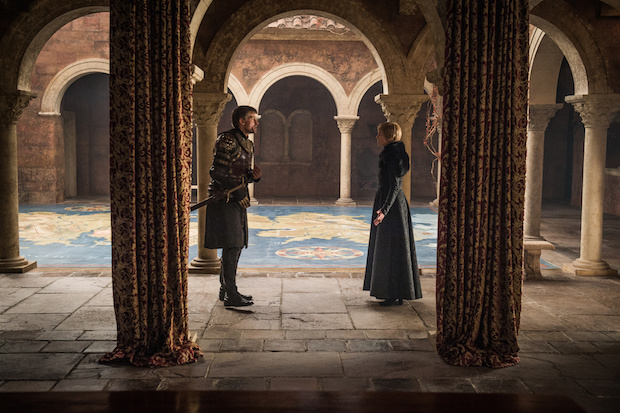Another season of Game of Thrones is over, and nobody knows when it will return. After a run of seven short weeks, last night’s extended ‘The Dragon and the Wolf’ brought the curtain down on Westeros for the time being, except the curtain here was the colossal wall of ice that is the last barrier between the living and the dead.
‘The Dragon and the Wolf’ is a strange beast – extending its running time to 80 minutes allows the filmmakers to avoid most of the pitfalls of this season (notably the characters’ mysterious ability to teleport around the vast continent) but they are missing the confidence to know exactly what to do with that space. The episode opens with a, quite literally, theatrical summit at an abandoned ‘dragon pit’, that feels both far too stagey and also incongruous with the tone of the show during the halcyon days of its early seasons. Cersei, Jaime, Jon Snow, Tyrion, Daenerys – not to mention almost all the beloved supporting characters – are brought together for the first time, but this sucks a lot of the tension out of the scene. Deals in Game of Thrones used to be bartered by individuals; this United Nations style convention feels out of place.
It also occupies a lot of space in the episode but reveals very little. Cersei twists and turns under the pressure of the looming threat of dragons, but ends up pursuing a course of action that fits precisely with her quotidien motives, which have been immutable since the first episode. House Lannister is going to watch the world burn (or freeze) and then rule the ashes. Jaime, however, is not onboard with his sister/wife’s plan and dashingly rides north alone, defying her will. I am unsure how much difference a one-handed man will make against the zombie horde, but it’s a nice gesture.
If this was all relatively static, the flirtation between Jon Snow and Daenerys Targaryen moved quicker than a two-eyed raven. One minute he was stroking her dragon, the next they were engaging in full blown incest on a boat. Of course, they don’t yet know they’re related: that bombshell (like the news that water is wet) was dispatched by Bran with the assistance of Sam Tarly. That revelation has been a long time coming, but it is testament to Game of Thrones sterling work for the pro-incest lobby that we are still cheering as aunt and nephew get down to business. It has to be said that, for a man enjoying only the second amorous encounter of his life (and the first not to happen in a freezing cave), Jon looks very confident in his attempt to prolong the Targaryen bloodline.
Whether their relationship survives Bran’s revelations will remain to be seen, but the show’s final act, where the Ice Dragon brings down the wall at Eastwatch, might take their mind of petty issues like whose brother was whose father. The Night King, riding the resurrected Viserion, paves the way for the army of the dead to head south on their seemingly unstoppable conquest of Westeros. I am still not sure what exactly is motivating the White Walkers but I suppose that is not the point: at some point, even the undead long for a beach break.
The other subplot to be delivered is the one that troubled me the most. After a season of indifferent cat-and-mouse games with Sansa and Arya, which repeatedly sucked momentum out of episodes, Littlefinger’s game is resoundingly ended. Only the most obtuse viewer will have failed to anticipate Sansa turning on Lord Baelish, and Arya’s throat slitting, in the manner of Meryn Trant and Walder Frey, is nicely executed (no pun intended). But I can’t help but feel the writers have let Littlefinger down. When working from George R.R. Martin’s source material, he was the machiavellian genius who catalysed the whole narrative. After conspiring with Olenna Tyrell in the murder of Joffrey, Littlefinger is abandoned to the vaguest of plotlines, as he heads north to support Sansa. For the last two seasons, he has merely moped in the shadows at The Eyrie, Castle Black and Winterfell, looking increasingly impotent and inconsequential. He has appeared to be on borrowed time for a while, not least because he is loathed by Thrones fans generally and the series has become more and more fan-servicing, but he deserved better than what the show gave him. He should’ve died as a consequence of one of his perverse, excessively complicated schemes; instead he fell victim to the impression that he could no longer impact the progression of events. House Baelish ended up going out with nothing of the bang it deserved.
When its final season rears its head, possibly in 2019, only House Lannister and House Targaryen will still be playing the game. Season Seven has, at times, moved impossibly quickly, yet the board has hardly changed since Cersei blew the roof off the Sept of Baelor. Stalemate in the war for the Seven Kingdoms, whilst the dead continue their conquest: we’ve been here before. With only six episodes remaining, there will be less time for the slow-burn wooing we saw this season between Jon and Dany (my personal highlight), though I hope time will be made for Tormund to set to work on the ‘giant babies’ he’s planning with Brienne. That sort of soap opera scale drama is what has been lacking all season, and with dragon-on-dragon violence to come, it may disappear altogether. Still, the situation is beautifully poised and anticipation, when the show finally returns, will be at fever pitch.







Comments